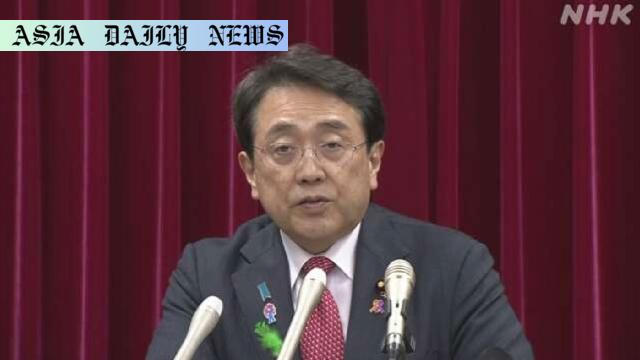Trade Negotiations: Japanese Economic Minister Akazawa Ryosei meets with U.S. leaders for pivotal trade discussions amidst tariff debates.
Japanese Minister Akazawa Ryosei held key trade discussions in Washington.
The U.S. Treasury Secretary described trade talks as going ‘very well.’
U.S.-Japan negotiations reflect mutual commitment amidst global tariff tensions.
President Trump announced finalized trade deals with the Philippines.

Introduction: A Crucial Moment in U.S.-Japan Trade Relations
The trade talks between Japan and the United States represent a significant moment in global economic strategy as both nations navigate the complexities of tariffs and negotiations amidst a shifting geopolitical landscape. Japan’s Economic Revitalization Minister Akazawa Ryosei recently embarked on a key diplomatic mission to the United States, engaging with top U.S. officials to discuss pivotal trade issues. The discussions come at a critical time when the global economy faces uncertainty, underscoring the importance of mutual agreements between two economic powerhouses.
Strategic Meetings and Goals of the Negotiations
During his visit, Minister Akazawa met with U.S. Commerce Secretary Howard Lutnick in a two-hour session that reportedly delved deep into the intricate details of trade policies. This was followed by talks with Treasury Secretary Scott Bessent, who remarked that the discussions were “going very well.” Minister Akazawa’s negotiation skills were praised, with the U.S. side recognizing Japan as “tough negotiators.” The shared sentiment of progress and collaboration highlights mutual respect and dedication to resolving pressing trade challenges efficiently.
Implications for U.S.-Japan Economic Partnership
A larger theme underlying these discussions is the strengthening of U.S.-Japan relations. These negotiations illustrate the alignment of interests concerning not just trade but also broader economic and defense partnerships. Japan’s proactive approach is reflective of its commitment to maintaining productive relationships with trading partners, particularly the United States, amid growing competition and tariff wars globally. As President Trump shared updates on new trade arrangements with other nations like the Philippines, the U.S.-Japan negotiations further emphasize America’s vital role in reshaping global trade dynamics.
Broader Impact on the Global Trade Environment
The ongoing trade discussions are part of a broader narrative of economic diplomacy among global powers. As the deadline for tariffs with China approaches, the meetings take on added significance. The United States is navigating groundbreaking deals with multiple nations, and the talks with Japan convey attempts to stabilize global markets and reduce tensions. Minister Akazawa’s visit showcases Japan’s robust stance, highlighting its readiness to adapt and foster deals that benefit both sides. Additionally, the new trade deal with the Philippines, boasting a 19 percent tariff agreement, reflects the broader ambition to balance trade relationships globally.
Conclusion: Progress Achieved and Future Prospects
The recent U.S.-Japan trade discussions reflect consistency, dedication, and effective dialogue between two economic giants. Minister Akazawa’s efforts, coupled with a receptive and strategic U.S. approach, indicate a promising trajectory for future trade agreements while underscoring the importance of trust and diplomacy in such engagements. Additionally, comparing this to other deals, such as the Philippines agreement, suggests that the current U.S. administration seeks to establish balanced relationships internationally. As talks with China loom, Washington’s multi-nation strategy could reshape the dynamics of international trade for decades to come.
Commentary
The Significance of Continued Dialogue
The recent trade negotiations between Japan and the United States underline the critical role of global cooperation in modern economics. In a world increasingly defined by competition, the consistent dialogue between these two nations demonstrates the value of diplomacy. Japan’s methodical approach, spearheaded by Minister Akazawa Ryosei, shows not only a commitment to its trade objectives but also a willingness to adapt in the face of changing international dynamics. This reflects Japan’s understanding that partnerships, especially with allies like the United States, are fundamental to achieving long-term economic stability.
Progress Reflecting Broader Themes
As the international trade landscape shifts, these bilateral discussions seem to epitomize a return to carefully crafted dialogues over hasty, unilateral tariffs or actions. With U.S. Treasury Secretary Scott Bessent acknowledging Japan’s rigorous preparation and negotiation tactics, it is evident that both sides have entered these talks with mutual respect. Importantly, these developments also hint at an alignment in objectives concerning shared economic goals and a stronger consolidated approach to trade challenges.
Looking Beyond U.S.-Japan Negotiations
While the U.S.-Japan discussions inspire optimism, they are just one layer of a broader, more complex global trade strategy. As President Trump finalizes deals with countries like the Philippines and sets deadlines for China-related discussions, these steps highlight a clear global strategy. Trade talks between significant players like Japan and the U.S. serve as a template for future engagements, illustrating the importance of dialogue, fairness, and collaborative growth. Moving forward, it’s crucial for participants in global trade to view these negotiations as opportunities for mutual growth rather than zero-sum games.
Final Thoughts
Ultimately, bilateral discussions, like those between the United States and Japan, are the bedrock of effective international relations in an increasingly polarized economic climate. By focusing on shared goals and fostering a cooperative spirit, both countries accomplish more than just resolving trade disputes—they also contribute to global economic stability and prosperity.


